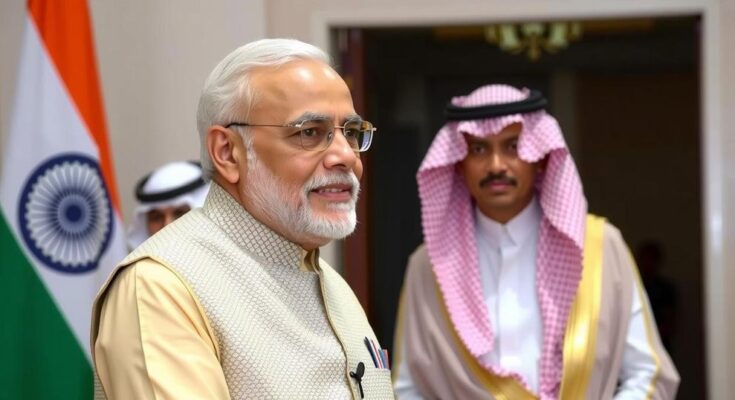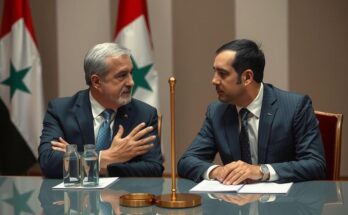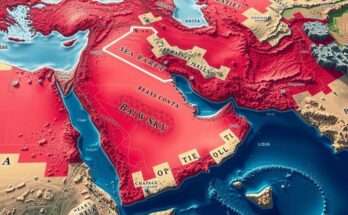Prime Minister Narendra Modi’s historic visit to Kuwait aims to strengthen bilateral ties, diversify non-oil trade, and acknowledge the contributions of the Indian diaspora. Highlights include labor welfare initiatives, cultural diplomacy, and meetings with leadership in preparation for formal talks.
Prime Minister Narendra Modi is currently on a significant two-day visit to Kuwait, marking the first visit by an Indian leader to the Gulf nation in 43 years since Indira Gandhi. His agenda revolves around enhancing bilateral relations, diversifying non-oil trade, acknowledging the contributions of the Indian diaspora, and advocating for the Global South. During his visit, Modi has been actively engaging with various leaders as well as the Indian community, emphasizing labor welfare, cultural exchanges, and addressing crucial bilateral issues.
The Prime Minister commenced his first day in Kuwait with a warm reception from Sheikh Fahad Yousef Saud Al-Sabah and other dignitaries. He prioritized visiting a labor camp in Mina Abdullah, where he showed concern for the welfare and living conditions of Indian workers. Modi’s dedication to labor welfare underscores the Indian government’s commitment to ensuring the rights and well-being of its citizens abroad.
In a poignant moment, PM Modi met with Abdullah Al Baroun and Abdul Lateef Al Nesef, the latter having published Arabic translations of the Ramayana and Mahabharata, reflecting cultural diplomacy. Additionally, he responded favorably to a request to meet 101-year-old Mangal Sen Handa, an ex-IFS officer, showcasing the Prime Minister’s engagement with the Indian diaspora at personal levels.
During a lively gathering dubbed ‘Hala Modi,’ which mirrored his previous ‘Howdy Modi’ event in the United States, PM Modi addressed the significant Indian community in Kuwait, referring to them as a “mini-Hindustan.” He commended their invaluable contributions to both Kuwait and India. The Prime Minister reiterated his gratitude to Kuwaiti leadership for their supportive policies towards Indian expatriates and invited participation in key events such as the Maha Kumbh and Pravasi Bharatiya Divas.
PM Modi later attended the inaugural ceremony of the 26th Arabian Gulf Cup as the Amir’s Guest of Honour, engaging in informal discussions that laid the groundwork for more rigorous discussions on vital matters such as trade, defense, and energy. He maintained that India plays a crucial role in championing the needs of the Global South, highlighting its commitment as a steadfast ally in crises and as a proponent of inclusive growth and sustainable development.
Prime Minister Narendra Modi’s visit to Kuwait is vital for both nations, emphasizing trade relations, particularly in non-oil sectors, which is crucial given the Gulf nation’s reliance on oil. The Indian diaspora contributes significantly to Kuwait’s economy, thus Modi’s engagement signifies India’s appreciation of these contributions and a commitment to safeguarding their welfare. Further, this visit serves as a diplomatic endeavor to strengthen ties amid global economic changes, particularly in the context of India’s advocacy for the Global South.
In conclusion, Prime Minister Narendra Modi’s visit to Kuwait represents a landmark effort to foster closer bilateral ties through cultural connections and economic partnerships. By prioritizing the welfare of the Indian diaspora and emphasizing trade diversification, the Prime Minister is setting the stage for enduring relations between India and Kuwait. Furthermore, his leadership in advocating for the Global South positions India as a proactive participant in global diplomatic efforts.
Original Source: www.indiatoday.in




